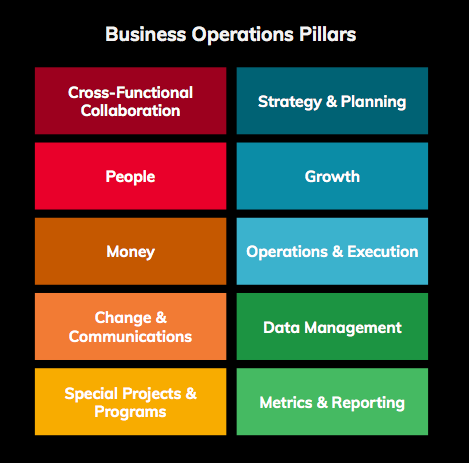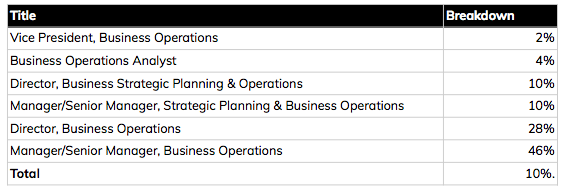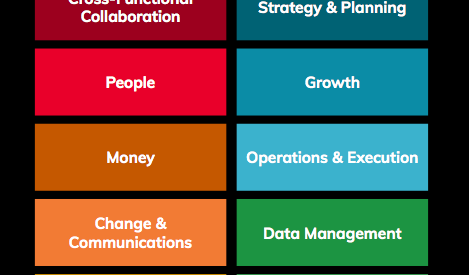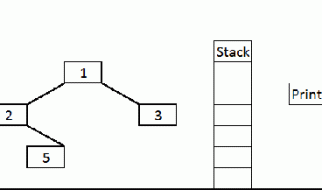 10 Pillars of Business Operaitons
10 Pillars of Business Operaitons
When I tell someone I do ?business operations?, nine out of ten times the reaction is ?and what is that??. Business operations has been an emerging role, but is not as prominent as other operations role such as Marketing Operations, Sales Operations or even Product Operations.
I have talked to many business operations professionals, and have heard a lot of consistencies in terms of responsibilities, challenges, expectations. To build on that, I read through 50 business operations job descriptions to better understand internal mechanics of business operations at technologically inclined companies in Silicon Valley.
I focused solely on the business operations jobs and didn?t spend too much time on hybrid roles. Here are insights about titles, experience and education requirements, technical requirements, and skills and most importantly what the role is all about.
Titles
By design, I prioritized and focused on Manager and Director of Business Operations role rather than senior executive roles such as Vice President and Chief Operating Officer.

Companies
Through simple LinkedIn Jobs search, I filtered business operations roles at these Silicon Valley tech companies: Box, Apple, Amazon, Cisco, IBM, Adobe, Lending Club, Google, Door Dash, Pintrest, Groupon, Microsoft, Pandora, Slack, Tesla and among few others.
Roles & Responsibilities
Business Operations roles can be very unique and vary based on the industry and the organization. However, in this search I learned that every business operations job description consisted of at least three or more of the listed responsibilities below. To capture the completeness of the responsibilities, I aggregated, parsed and summarized them in my own terms:
1. Cross-Functional Management
- Facilitate Conversation: Create opportunities for synergies across the business ecosystem on topics such as developing business models, organizational design and cross-functional initiatives to drive long term business sustainability.
- Decision Making: Build consensus among cross-functional teams and influence decision making with leadership audiences.
- Build Relationships: Build productive and positive relationships across the organization at all levels to drive influence.
- Holistic View & Alignment: Develop and utilize frameworks to help structure the team?s thinking, drive visibility, and facilitate alignment.
2. Operations
- Execution: Lead day to day operations and deliver on strategy and operational plans from the planning process against the strategic vision for the company.
- Operational Cadence/Rhythm of Business: Establish an operating rhythm of the business to ensure the organization is running effectively and efficiently to meet goals and objectives.
- Cost Reduction: Find and pursue cost reduction opportunities.
- Business Process Improvement: Manage centralize repository of processes and improve processes to minimize complexities and optimize to promote effective operations.
3. Data
- Collection & Insights: Gather and analyze data, formulate and test hypotheses, synthesize findings, develop go-forward plans and help drive and translate recommendations into results.
4. Reporting, Metrics, and KPIs
- Reporting: Author, manage, and deliver executive level reporting, including weekly, monthly, quarterly status reports to manage risks and issues and improve team communication and collaboration.
- Metrics: Lead creation, identification, and insights of metrics to improve business performance and drive business actions.
- KPIs: Develop and track key KPIs across the team to track strategic goals, milestones and accomplishments.
5. Strategic Planning
- Insights Framework: Build the framework for the analysis behind company-wide strategic decisions related to all functions.
- Planning and Business Rhythms: Run organizational planning and business rhythm process in alignment with all other functions to develop vision, mission, goals, objectives and key results (OKRs), resource and capital plans, etc.
6. Growth
- Strategic Partnerships: Asses and develop potential strategic partnerships from technology and GTM perspective.
- M&A: Manage all merger & acquisition activities with focus on due diligence and post deal integration.
- GTM & International: Orchestrate the design and execution of all aspects of go-to-market.
- New Opportunities: Explore new markets and business models through industry trends, historical trends, forward looking forecasts, competitive assessment, etc. and build/evaluate recommendations for strategic growth and monetization.
7. Programs
- Special Projects Identify and implement new initiatives with key stakeholders to develop, champion, and launch new initiatives.
- Internal Consultant: Act and operate as an internal consultant, working directly with multiple stakeholders, management, and various related departments be able to optimize team performance.
- Project Management: Take complete ownership of projects/ programs from cradle to grave: business case, scope, cost, schedule, action cycles, risks, issues, decisions, interdependencies and milestones.
8. People
- Resource Planning & Management: Implement and maintain resource management system to effectively manage resource utilization.
- Culture & Engagement: Maintain harmony and ensure shared responsibility of business objectives with focus on team development and employee career growth.
- Recruiting & Onboarding: Help with recruiting operations and oversee new employee onboarding and training programs.
- Training: Engage employees through meaningful training and growth opportunities.
9. Money
- Budget: Plan and manage budget including annual, quarterly and monthly expense tracking.
- ROI:: Partner with Finance and the business to manage, analyze and review organizational budgets, measure & track ROI, and reconcile and explain discrepancies.
- Procurement: Manage procurement process along with vendor and supplier relationships.
10. Communications and Change Management
- Communication Calendar: Create, manage and maintain specific communications and cadence for All Hands meetings, QBRs, team meetings, ongoing communications, etc.
- Framework: Establish a structure and cadence of program and function reviews to increase visibility, drive alignment, and resolve blockers.
- Change Management: Develop strategic change and drive change management and business transformation efforts.
Experience
- The number of years of experience varies based on position. For example, a typical manager level job requires 3?5 years of experience.
- Industry experience for the company is always beneficial.
- Management and people leadership experience is a must when the role requires managing people.
- Type of experience companies are looking for in business operations roles:
Consulting
Investing Banking
Corporate Strategy and Development
Venture Capital
Finance and Accounting
Project and Program Management
Product Management
Vendor Management
Customer Service
Sales Operations, Business Operations, or Other Operations Roles
Education & Technical Skills
A degree or certificate is table stakes for any job these days, and that?s no different for business operations. Typically, all jobs require a Bachelor?s degree, but the most common type of majors for business operations roles are:
- Business Administration
- Math or Statistics
- Finance
- Economic
- Engineering or Computer Science
- MBA is a major requirement for business operations roles
Other nice to have and valuable certificates are:
- Certified Financial Analyst
- Change Management / Communications Certification
- Lean Six Sigma Master Black Belt
- Project Management Institute Certifications (PMP)
Technical Skills
- Microsoft Suite: Powerpoint, Excel, Word, etc.
- SQL and Data Analysis type tools
- Sales tools like Salesforce, Marketo, etc.
- Finance/Accounting tools like Quickbooks, NetSuite, etc.
Skills
These 50 skills repeatedly were part of the business operations qualifications and requirements:
- Accountable and Reliable
- Active Listener
- Advisor and Counselor
- Ambitious and Driven
- Analytical
- Big Picture, Strategic Mindset, Visionary
- Business Acumen
- Challenge Status Quo and Embrace Change
- Coach
- Collaborative and Relationship Building
- Comfort with Ambiguity
- Committed and Dedicated
- Confidential and Integrity Aware
- Consultative
- Creative and Curious
- Credible Voice
- Detail Oriented
- Effective and Efficient
- Effective Communications
- Effective Team Building
- Empowering and Motivating
- Energetic and Passionate
- Entrepreneurial Drive
- Fast Learner
- Fast Paced Environment
- Flexible
- Go Getter Get it Done ad Results Driven Execution Focused
- High Emotional intelligence
- Humble
- Independent
- Influence People
- Innovative
- Intellectual Horsepower and Curious
- Leader
- Manage Multiple Projects and MultiTask
- Negotiator
- Optimistic
- Organized
- Pivot Quickly based on Shifting Priorities
- Pragmatic and Structured Thinker
- Presence to interact with both executive management and front-line employees
- Prioritization ? set priorities and manage priorities with others
- Relentless Leadership
- Researcher and Resourceful
- Resolve Conflicts
- Scalability
- Self-starter with the ability to influence across functions and the motivation to go above and beyond the task at hand.
- Sense of humor and ability to work while having fun.
- Sharp Mind
- Solving Complex Problems
Get a free personalized Career Navigation Plan ? think Google Maps for your Career!


